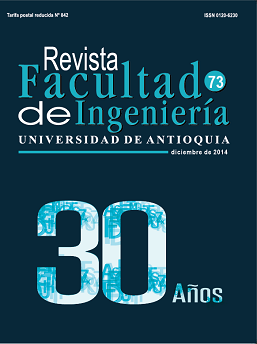State estimation technique for a planetary robotic rover
DOI:
https://doi.org/10.17533/udea.redin.17275Keywords:
state estimation, planetary exploration, Extended Kalman Filter, mobile roversAbstract
Given the long traverse times and severe environmental constraints on a planet like Mars, the only option feasible now is to observe and explore the planet through more sophisticated planetary rovers. To achieve increasingly ambitious mission objectives under such extreme conditions, the rovers must have autonomy. Increased autonomy, obviously, relies on the quality of estimates of rover's state i.e. its position and orientation relative to some starting frame of reference. This research presents a state estimation approach based on Extended Kalman Filter (EKF) to fuse distance from odometry and attitude from an Inertial Measurement Unit (IMU), thus mitigating the errors generated by the use of either system alone. To simulate a Sun-sensor based approach for absolute corrections, a magnetic compass was used to give absolute heading updates. The technique was implemented on MotherBot, a custom-designed skid steered rover. Experimental results validate the application of the presented estimation strategy. It showed an error range within 3% of the distance travelled as compared to about 8% error obtained from direct fusion.
Downloads
References
Tavera, M., Lengerke, O. & Dutra, M. (2011). Comparative study for chaotic behaviour in fire fighting robot. Rev. Fac. Ing. Univ. Antioquia, 60, 31- 41.
Khan, A., Riaz, S. & Iqbal, J. (2013). Surface estimation of a pedestrian walk for outdoor use of power wheelchair based robot. Life Sci J., 10(3), 1697- 1704.
Ali, K., Vanelli, C., Biesiadecki, J., Maimone, M., Cheng, Y., Martin, A. & Alexander, J. (2005). Attitude and position estimation on the Mars exploration rovers. Proceedings of the IEEE International Conference on Systems, Man and Cybernetics. Hawaii, USA. 2005. pp. 20-27. DOI: https://doi.org/10.1109/ICSMC.2005.1571116
J. Hidalgo, P. Pantelis, J. Kohler, J. Del-Cerro, A. Barrientos. “Improving planetary rover attitude estimation via MEMS sensor characterization”. Sensors. Vol. 12. 2012. 2219-2235 DOI: https://doi.org/10.3390/s120202219
F. Azizi, N. Houshangi. Mobile robot position determination using data from gyro and odometry. Proceedings of the Canadian Conference on Electrical and Computer Engineering. Ontario, Canada 2004. pp. 719-722.
M. Thein, D. Quinn, D. Folta. Celestial Navigation (CelNav): Lunar surface navigation. Proceedings of the AIAA/AAS Astrodynamics Specialist Conference and Exhibition. Hawaii, USA. 2008. DOI: 10.2514/6.2008-6759. Available on: http://arc.aiaa.org/doi/pdf/10.2514/6.2008-6759 DOI: https://doi.org/10.2514/6.2008-6759
P. Benjamin. “Celestial navigation on the surface of Mars”. NASA STI/Recon Technical Report. ADA392455; USNA-1531-2. Vol. 1. 34 pages. 2001. Naval Academy. Annapolis, USA. Available on: http://www.dtic.mil/dtic/tr/fulltext/u2/a392455.pdf. Accessed: July, 2014.
J. Gammell, C. Tong, P. Berczi, S. Anderson, T. Barfoot, J. Enright. Rover odometry aided by a star tracker. Proceedings of the IEEE Aerospace Conference. Montana, USA. 2013. pp. 1-10. DOI: https://doi.org/10.1109/AERO.2013.6496953
M. McClelland, M. Campbell, T. Estlin. Qualitative relational mapping for planetary rovers. Proceedings of Workshop on Intelligent Robotic Systems AAAI. Washington, USA. 2013. pp. 110-113.
M. Saad. State estimation technique for a planetary rover. Thesis Helsinki University of Technology. Espoo, Finland. 2007. pp 1-65. Available on online at http://autsys.aalto.fi/en/Publications/M34834. Accessed: July, 2014.
E. Baumgartner, H. Aghazarian, A.Trebi. Rover localization results for the FIDO rover. Proceedings of the SPIE 4571, Sensor Fusion and Decentralized Control in Robotic Systems IV. Boston, USA. 2001. pp. 34-44.
J. Iqbal, S. Heikkilä, A. Halme. Tether tracking and control of ROSA robotic rover. Proceedings of IEEE International Conference on Control, Automation, Robotics and Vision. Hanoi, Vietnam. 2008. pp. 689- 693. DOI: https://doi.org/10.1109/ICARCV.2008.4795601
J. Iqbal. Tether tracking and control of ROSA robotic rover. Thesis Helsinki University of Technology. Espoo, Finland. 2007. pp. 1-93. Available on: at http:// autsys.aalto.fi/en/Publications/M34826 Accessed: October 27, 2013.
J. Hakenberg. Mobility and autonomous reconfiguration of Marsokhod. Thesis Helsinki University of Technology, Espoo, Finland. 2008. pp. 1-58. Available on: http://autsys.aalto.fi/en/Publications/M36440. Accessed: October 27, 2013.
J. Iqbal, S. Riaz, A. Khan, H. Khan. “A novel trackdrive mobile robotic framework for conducting projects on robotics and control systems”. Life Sci .Vol. 10. 2013. pp. 130-137.
Downloads
Published
How to Cite
Issue
Section
License
Copyright (c) 2018 Revista Facultad de Ingeniería

This work is licensed under a Creative Commons Attribution-NonCommercial-ShareAlike 4.0 International License.
Revista Facultad de Ingeniería, Universidad de Antioquia is licensed under the Creative Commons Attribution BY-NC-SA 4.0 license. https://creativecommons.org/licenses/by-nc-sa/4.0/deed.en
You are free to:
Share — copy and redistribute the material in any medium or format
Adapt — remix, transform, and build upon the material
Under the following terms:
Attribution — You must give appropriate credit, provide a link to the license, and indicate if changes were made. You may do so in any reasonable manner, but not in any way that suggests the licensor endorses you or your use.
NonCommercial — You may not use the material for commercial purposes.
ShareAlike — If you remix, transform, or build upon the material, you must distribute your contributions under the same license as the original.
The material published in the journal can be distributed, copied and exhibited by third parties if the respective credits are given to the journal. No commercial benefit can be obtained and derivative works must be under the same license terms as the original work.










 Twitter
Twitter